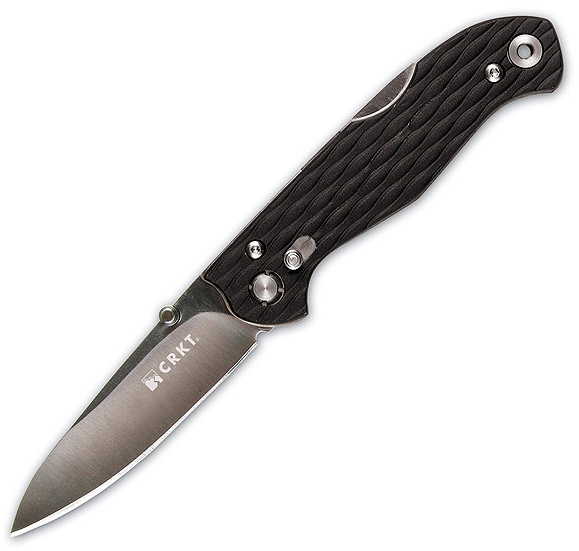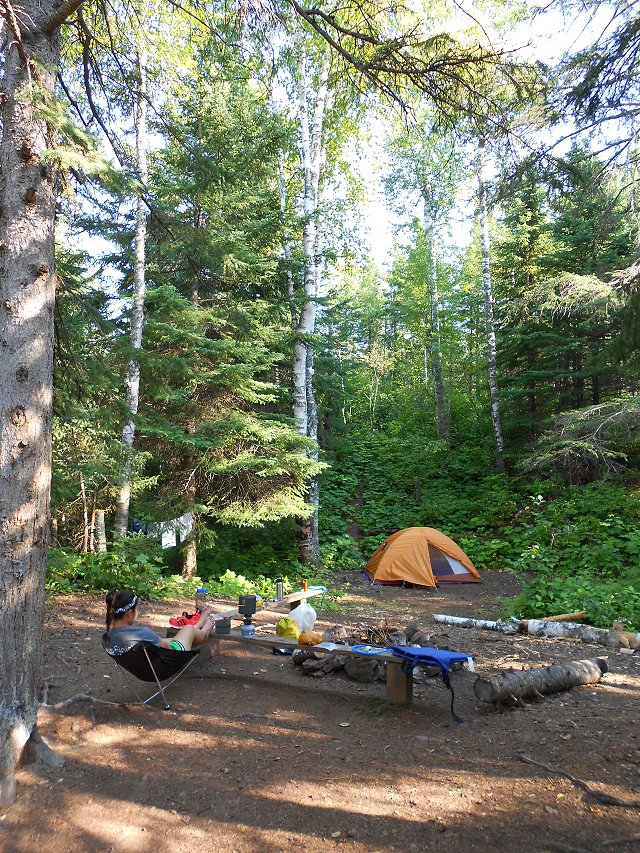Camping Gear
Posted: Mon Jul 06, 2015 8:56 am
SS,AgentDoubleS wrote:I have been looking to start camping trips for quite sometime, but haven't really got down to it. Looking at your pictures it seems I'm missing out on a lot. What would be ideal would be a motorcycle trip in India on a dual sport motorcycle with camping at some good locations built in. Motorcycle or on foot, I know this is something I cant be missing out on, particularly with my recently fueled interest in studying trees.
I'd be keen to know more about the gear you use if you dont mind sharing: the tent and sleeping bag? Backpack, brand and how many litres? How much weight do you carry?
Car/Motorcycle camping is big in the USA. A lot of people do it. Google "Motorcycle Camping". The advantage of doing it in the US is that there are thousands of State Parks and National Parks. In addition there are also a large number of local, county and privately owned campgrounds. You can even find places in the big cities like my visit to Afton State Park in the Twin Cities. Another advantage is that there are no Apex predators in most areas.
India has many gorgeous places to do something like that but there are places that would be off limits to tent camping like the Sundarbans. I don't know if the Government still maintains Dak bungalows but we used to be able to stay in a few of those, in out of the way places.
Gear:
I tend to stay away from most Military Surplus equipment because while it is very durable, it is generally a lot heavier than dedicated civilian camping equipment. When car or motorcycle camping, weight is not that big a deal but when you have to lug everything on a 30 or 40 mile hike, every ounce counts. I've had setups that weighed 45/50 lbs but it is not pleasant when out for days in rugged terrain. I quickly reduced the weight. When you start out, you'll take everything but the kitchen sink but you'll quickly learn what is essential.
The main comfort items are a tent, sleeping bag and sleeping pad. You can sleep under a tarp but it is no fun when the weather turns bad. I do it for relaxation rather than attempting to run a marathon like some people do, so I like some creature comforts. Our tent is 4 lbs, sleeping bag is about a pound and the air mattress is under 2 lbs.
You can get by with something cold for lunch but there is no substitute for a cup of hot coffee in the morning and a hearty breakfast or a hot meal at the end of the day.
The Jetboil stove is 15 oz. and fuel canisters are 10 to 12 oz. each. A change of clothes and extra socks make up some of the weight. A rain jacket, a fleece jacket and a wool watch cap keeps the cold and wet away. Our main weight is food and water. My water purification system weighs 16 oz. A few lightweight Aluminium posts and pans and utensils fill out the load.
Food & Water:
Fresh meats and fish wont keep for very long on the trail so hikers tend to carry a lot of dehydrated meals. They are very light in weight and you can carry a number of them. Just add hot water and you have a meal.
For dehydrated meals, Mountain Home dehydrated entrees are very popular. Military MRE (Meals Ready to Eat) are popular but they are heavy. Both Mountain Home and MRE's actually have some pretty tasty entrees. MRE's come prepackaged with a heater so you don't need a stove for them.
We also get precooked Basmati rice packs here (boil in the bag for 10 minutes) and many prepackaged vegetarian Indian entrees (boil in the bag for five minutes and pour on the rice) which taste pretty authentic. This is brand named Tasty Bite. I love this stuff but the packets are heavy as they are already hydrated.
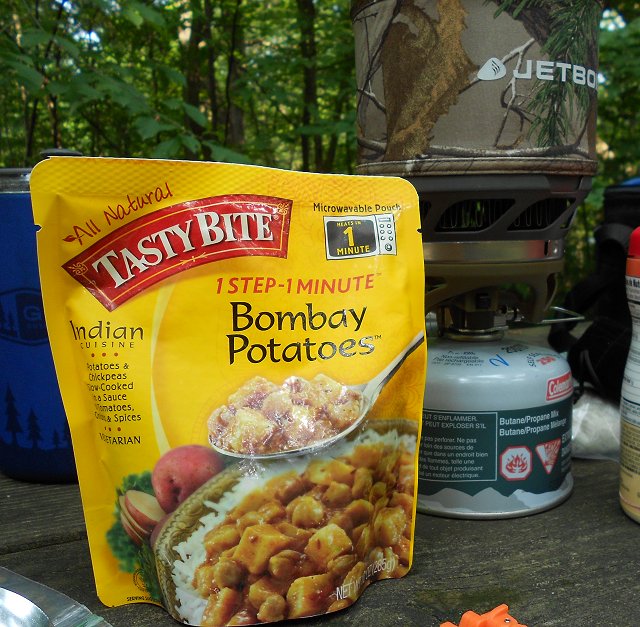
Bombay Potatoes on the picnic table. This was during a recent day hike.
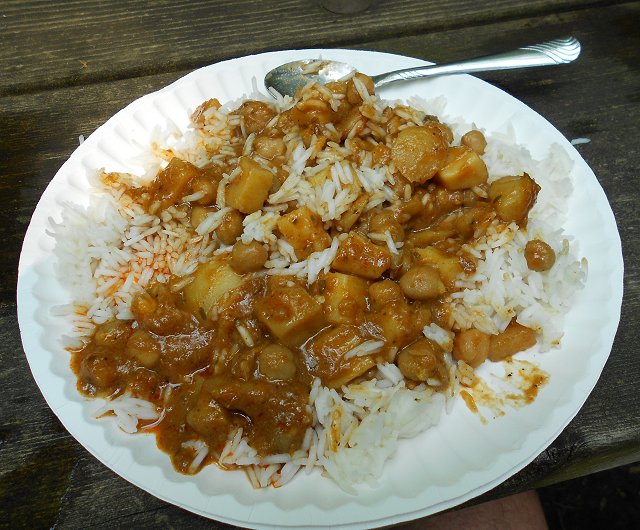
Bombay Potatoes on Basamati Rice. Mm-Mmm good!
We also take stuff like pancake batter, margarine, dehydrated hash browns and dehydrated sausage. Lipton 'cup o soup' packets, Tea bags, Coffee, powdered creamer, sugar and salt.
All this dehydrated stuff needs water to reconstitute.
You can get water in a lot of places; Rivers, streams, creeks, ponds etc. However, water can have bacteria, virii, pesticides, heavy metals and even antibiotics in it. A good filter is a must if you want to not suffer any side effects from your camping trip.
Stoves that I have used: Jetboil Minimo, MSR Whisperlite, Coleman Micro backpack stove.
The Jetboil is by far the fastest stove that I have used. You can literally be in camp two minutes and have a hot cup of soup ready.
Water purification system: Sawyer 2 Liter filter system

Sawyer two liter water purification system. This is a .1 micron system and will eliminate most bacteria and cysts but not virii (but that is not a problem in most parts of the USA).
Sawyer also sells a .02 micron system that will eliminate virii.
I have used several others, including the Platypus Gravity Filter, one of the Katadyn Hiker Pumps and the MSR Hyperflow system.
They all have their issues.
So far I like the Sawyer system the best.
Packs: I no longer use external frame packs. I use a High Sierra 55 Liter internal frame pack. I wouldn't buy it again but its not bad enough to throw away and buy a new one. It is not the best but works for me. My daughter uses a Granite Gear pack of about 40/45 Liters. There are hundreds of brands available. Popular brands are REI, Jansport, Kelty, Gregory, Granite Gear, Arcteryx and hundreds of Chinese knock offs. The quality of the knock offs has got much better lately. Eberlestock makes very high quality, heavy duty packs but they are heavy so they are not used much by hikers.
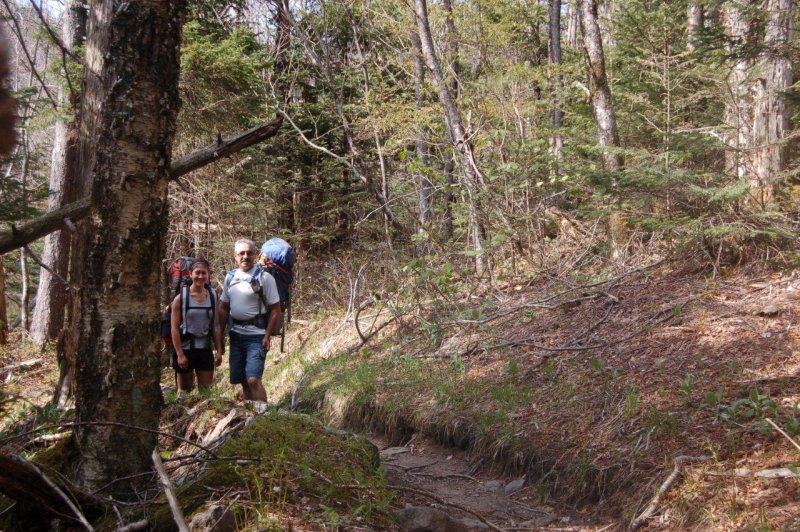
My daughter and I with our packs in Tennessee's Great Smokey Mountains National Park.
Clothing:
Cotton is very comfortable but not good for camping. When it gets wet, either from rain or from sweat, it takes a long time to dry. This causes chafing as you are hiking and makes you cold. Damp clammy clothes will make you uncomfortable and make you feel miserable. Not my idea of fun. For shirts worn when campiing, I've switched to all synthetic, wicking fabrics like Polyester and Polyester blends. They wick sweat away and dry quickly.
UnderArmor is one of the top brands but I also like Russel Athletics "Dri-Power" T-shirts. They're relatively cheap and if you wreck one, its not a big deal. They have worked very well for me. They can also be used as an undershirt.
Columbia makes excellent fleece jackets that will keep the cold out and to a certain extent; the wind out. Your rain jacket can double as a windbreaker in a pinch. Columbia Fleece jackets are very lightweight but still provide warmth.
For shorts, I like Nylon shorts for their wicking and quick drying properties. You can get shorts made of rip-stop nylon that are very durable. Wrangler used to make one model of which I have a few. These have a hidden zipped side pocket that fits my Ruger LC9 in its soft holster. Unfortunately they are no longer available.
There is one caveat about synthetic clothing. Some synthetics like Polyester very susceptible to damage from campfire embers and if they catch fire, they will melt to your skin. Just use common sense around a fire.
Tents:
I have used many different tents from canvas pup tents to today's freestanding domes.
I like the freestanding domes the best because they are very fast to put up. They also give you plenty of headroom. We often play scrabble or card games after dark, in the tent and two people can sit up very comfortably.
Currently we have a Coleman Sundome three person tent that I take when we go car camping and my daughter has our favorite, her Marmot tent, for when we backpack.
Her Marmot sets up very fast, literally three or four minutes from unpacking. This is a great boon if it is raining. The two doors are great; if you have to go to the bathroom at night, you don't have to step on or over the other person. We also like the two vestibules to keep your backpack and your boots, etc. on your own side.
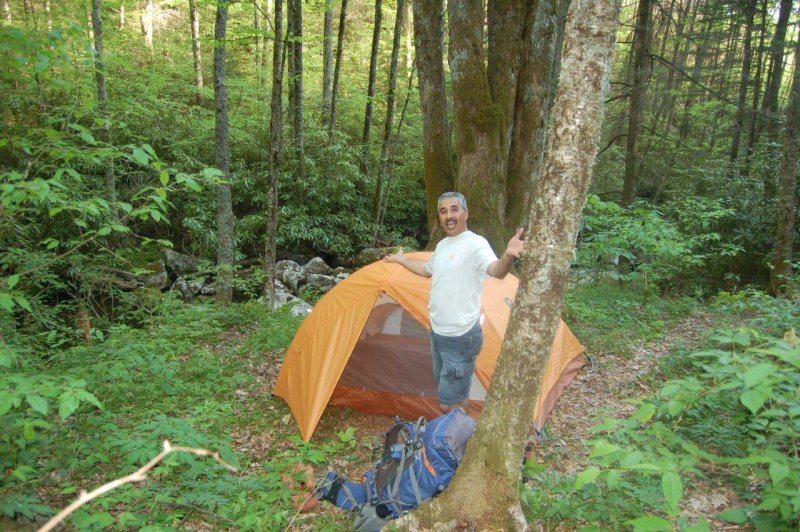
My daughter's Marmot tent has been with us in many different locations.
Her tent is similar to the Tungsten 2P. Watch the video on that page.
